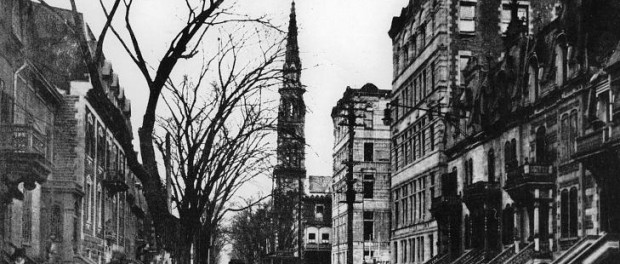The Priest’s University & Other Quebec Curios
 St. Denis street with Université Laval in the background, c. 1897, from the studio of William Notman and Son. Credit: McCord Museum.
St. Denis street with Université Laval in the background, c. 1897, from the studio of William Notman and Son. Credit: McCord Museum.
The history of Montreal’s, and, by extension, Quebec’s educational institutions paint a fascinating picture as to how and for whom education in this province served, and continues to serve today. Quebec has eighteen universities, three of which are English (Bishop’s, McGill, and Concordia).
Laval University, Université Laval for those of us who know better, is the oldest university in Quebec. Some of its buildings date back to the time around French colonisation. Laval, founded in 1663 but not granted its royal charter that conferred its status as a university in 1852 by Queen Victoria, has an undergraduate population today of just under twenty-nine thousand and a postgraduate population of just under nine thousand. Primarily a research university, that is, a university that offers many programmes that lead to academia, Laval offers what a typical university of such classification would offer: law, medicine, dentistry, and loads and loads of Master’s and PhDs. Prime Ministers St. Laurent, Mulroney, and Chrétien all graduated from Laval, as well as Premiers Jean Lesage, Lucien Bouchard, and René Lévesque, and many others.
And yet Laval University has its roots in religion. Along with Laval, the Quebec Seminary was founded the same year, its mission to form priests to, well, conquer the people with religion. The Quebec Seminary would merge with the Université Laval shortly after. Laval and the Quebec Seminary were both founded by François de Montmorency-Laval, the first Bishop of New France—who doesn’t want a university named after them, after all? When the British conquered New France, it would expand Laval’s programme offerings towards more liberal professions. From its original four faculties (law, theology, humanities, and arts), Laval would continue to expand into parts unknown such as philosophy and music.
Laval would continue to expand, and in 1878, it would open a second campus in Montreal. This, however, would eventually split, to become the University of Montreal. Laval would continue to be connected to its Catholic roots until the 1970s, when it adopted its new charter.





